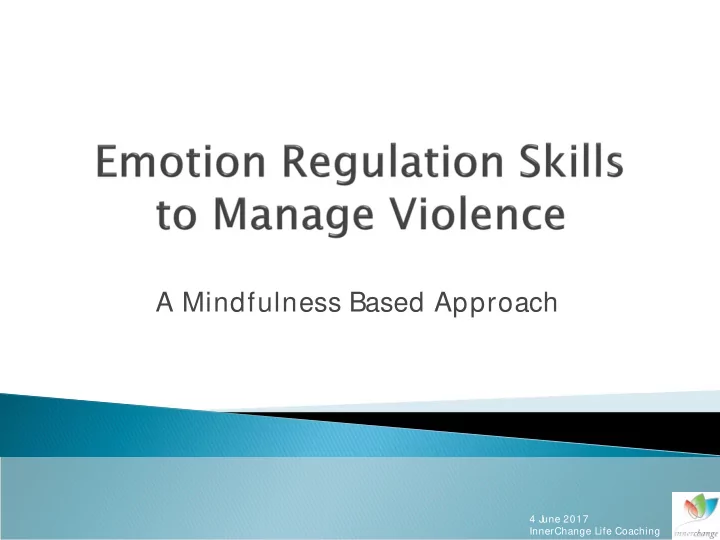

A Mindfulness Based Approach 4 J une 2017 InnerChange Life Coaching
In Increase crease capacit capacity to y to Decrease De crease Aggression Aggr ession seek seek hel help ea earlier rlier Pe Perp rpetra etrator tor Victim Victim 2
3
How Anger Goes out of Control Anger, Amygdala & Prefrontal Cortex Click to play video on YouTube 4
} 30 studies on effects of mindfulness training on brain structure and function } Brain changes (activity levels & volume & connectivity) ◦ Prefrontal Cortex (conscious decision making & emotional regulation ◦ Insula (internal body states) ◦ Cingulate cortex (decision making), ◦ Hippocampus (memory) ◦ Amygdala (emotion). } These changes appear to be consistent with the idea that mindfulness helps your brain regulate your emotions. (Rinske Gotink et al. 2016 - Erasmus MC, Rotterdam) 5
} Mindfulness Group (vs Control group) ◦ Amygdala activation decreases more ◦ Reported more decrease in anxiety ◦ More activation of the Prefrontal Cortex (PFC) ◦ More connection between the PFC & amygdala (Sara Lazar et al. 2011. Harvard Medical School) 6
} Paying kind attention to present experience, moment by moment, without judgement. } The awareness that arises through paying attention on purpose, in the present moment, non- judgmentally and compassionately. 7
} Mindfulness is the English translation of the word Sati in Pali (ancient language of Theravada Buddhism scriptures) } Sati is one of the inherent faculties of mind and heart. Not just the mind. } Rooted in Buddhism but Mindfulness in all true wisdom traditions. } Also in Persian Gnosticism (Irfan). Hozoor and shohood. 8
} Non- judgment does not mean we do not have preferences. } We can have preferences but do not judge our experience as ‘good’ or ‘bad’, ‘right’ or ‘wrong’. } We simply accept it as another experience. 9
} Acceptance is not approval. } Acceptance is not resignation. 10
} Anger is an inner state ◦ We usually attribute to others as the cause of it. } Anger can arise as result of ◦ Powerlessness, not- understanding, prejudices, false beliefs and assumptions, sense of entitlement, … } Let’s own our anger. } Work with anger instead of projecting & inflicting on others. } An Anger is ger is NO NOT Ag T Aggre gression ssion ◦ Aggression is destructive ◦ Anger can be useful (compassionate anger) 11
“J ust like our organs, our anger is part of us. When we are angry, we have to go back to ourselves and take good care of our anger. We cannot say, ‘ Go away, anger, I don’t want you. ’ When you have a stomach ache, you don’t say, ‘ I don’t want you stomach, go away. ’ No, you take care of it. In the same way, we have to embrace and take good care of our anger. J ust because anger or hate is present does not mean that the capacity to love and accept is not there. Love is always with you.” [Thích Nh ấ t H ạ nh. Zen Buddhist master, author, and peace activist.] 12
You are not your anger. You feel angry. Noticing your language can help: } Try not to say "I am angry“ ◦ Identification with anger } Instead say: "I feel angry“ ◦ Simple acceptance of your experience without judgment and identification; but with compassion for self and others. 13
let’s meditate together 14
7 Catch thoughts as early as possible 6 5 4 Intensity 3 2 1 0 Plain thought story begins story gethers momentum autopilot Time mindful not mindful 15
◦ Not Notice ice Notice your thoughts as the arise. Catch them as early as possible before they turn into a story and gather momentum. ◦ Assess Assess Make a quick assessment whether the thought is of service to you right now in this moment or not. ◦ Decide Decide Choose whether you wish to go with the thoughts or not. 16
} Mindfulness helps reduce violence ◦ Emotion regulation skills. ◦ Perpetrators: Less aggressive, own their anger, compassionate anger. ◦ Victims: Less wait before seeking help. Self- compassion, less self- blame and fear. } Anger is NOT Aggression } Own your anger & work with it. } Take up mindfulness practices. ◦ Sense your body often. ◦ Many types of meditations. ◦ Apps are available. } Do the NAD. For information & resources go to www.innerchange.com.au 17
Recommend
More recommend